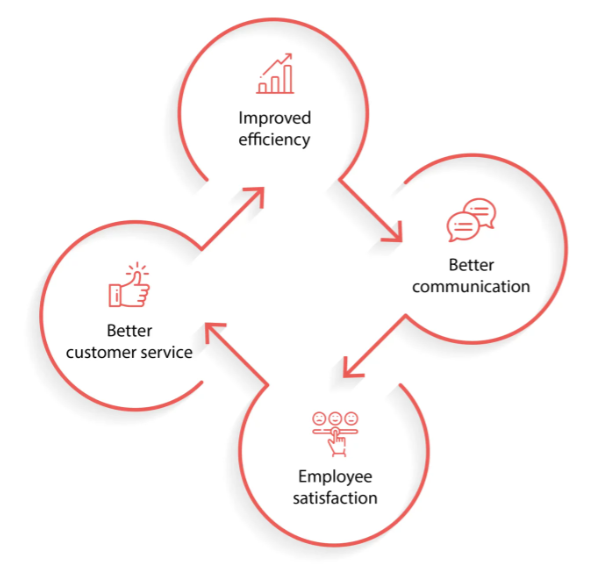Data-Driven Culture: Benefits, Examples, & Framework
Summarize this article with:
✨ AI Generated Summary
Adopting a data-driven culture enables organizations to make informed decisions, improve operational efficiency, and enhance customer experiences, providing a competitive edge and fostering innovation. Key steps include leadership commitment, investing in data infrastructure, promoting data literacy, ensuring data governance, and encouraging transparency and accountability. Platforms like Airbyte simplify data integration, improving data quality, accessibility, and accelerating insights to support a scalable, data-centric business environment.
Businesses are rapidly evolving, and staying ahead of your competition requires more than intuition and guesswork. Practicing a data-driven culture where evidence-based decision-making is prioritized can lead your organization to sustainable growth. In today's data-driven era, embracing data-driven practices is essential for long-term success and maintaining a competitive edge.
This approach utilizes data to gain insights into customer behavior, industry trends, and operational efficiency. But how can you cultivate a data-driven culture? What are the steps and its benefits? This article will answer all your questions, so let’s get started!
Introduction to Data Culture
Data culture refers to the values, norms, and practices that promote the use of data to inform decision-making within an organization. In a data-driven organization, data is not just a byproduct of operations but a strategic asset that drives every decision. A strong data culture is essential for organizations to stay competitive in today’s data-driven world. It enables businesses to make informed decisions, drive innovation, and improve operational efficiency.
Key characteristics of a data culture include data-driven decision-making, where decisions are based on data and analytics rather than intuition or anecdotal evidence. Transparency and accountability are also crucial, as they ensure that data is used ethically and responsibly. Continuous learning and improvement are fostered through ongoing training and development, helping employees stay updated with the latest data practices. Lastly, collaboration and communication are vital, as they encourage the sharing of data insights across departments, leading to more cohesive and strategic decision-making.
What Is Data-Driven Culture?
In a data-driven culture, data is a strategic asset actively collected to draw valuable insights and make informed decisions across all levels of your organization.
A data-driven culture instills a mindset that values data fluency, objectivity, and continuous improvement. It enables your teams to quickly adjust strategies in response to real-time feedback and evolving trends, enhancing performance and showing resilience in mitigating risks. Furthermore, data-driven cultures significantly enhance organizational effectiveness by fostering transparency and accountability, as conclusions are grounded in data instead of subjective opinions.
According to a Forrester Consulting survey commissioned by Collibra in 2020, organizations that adopted data-centric culture were 58% more likely to achieve their revenue goals than non-data-driven organizations. Yet, the same year, Seagate’s report ‘Rethink Data’ mentions that merely 32% of the data available to businesses gets utilized. This emphasizes the importance of inculcating a robust data-driven culture.
To establish such a culture, you must develop frameworks for data governance, prioritize data literacy, and invest in technologies facilitating data collection, analysis, and interpretation. Before we delve further and discuss the steps for building a data-driven culture, let’s consider its benefits!
Benefits of a Data-Driven Culture
The benefits of a data-driven culture are multifaceted and far-reaching, giving you an upper hand against your competitors. Here are some advantages that will have a significant impact on your bottom line:
Success stories from various organizations illustrate the transformative impact that a strong data culture can have, driving innovation, enhancing customer satisfaction, and gaining a competitive advantage.

Improved Decision-Making
Data gives you a clear picture of your organization’s past performance and highlights the importance of the decision making process within businesses aiming to create a data-driven culture. This leads to better resource allocation, reduced risks, and optimized outcomes across various departments such as marketing, operations, product development, and sales.
Improved Performance and Efficiency
As a data-driven organization, you can equip yourself to track and monitor key performance indicators. Analytics initiatives can significantly impact organizational outcomes, particularly when aligned with the overall business strategy and culture. Utilizing these data driven insights, you can identify areas for improvement, implement targeted interventions, and streamline processes to reduce costs.
Enhanced Customer Experience
According to a McKinsey survey, organizations employing customer analytics for new customer acquisition are 23 times more likely to outperform peers who don’t. Improving customer service is a key goal when creating a data-driven culture, as it helps in utilizing data effectively to identify customer patterns and ultimately reduce churn.
You can also leverage customer data, such as purchase history, customer demographics, and online behavior, to personalize your marketing campaigns, product offerings, and support interactions. This translates to a more satisfying customer experience, increasing brand loyalty and advocacy.
Innovation and Agility
Embracing a data-driven culture equips your organization to foster an environment of experimentation and innovation, leading to creative business solutions. Digital transformation is driving the need for a data-driven mindset and strategic planning, allowing companies to harness new insights and deliver personalized experiences. Based on changing circumstances, market dynamics, and customer demand, you can rapidly adapt your product development iterations and capitalize on the opportunities they offer.
Improved Risk Management
Data empowers your organization to predict and mitigate potential risks. Data management is crucial in establishing a robust data governance framework, ensuring security, compliance, and data quality. By analyzing historical data and industry trends, you can identify and address problems before they escalate.
Why Data-Driven Culture Matters?
A data-driven culture isn’t just a buzzword if you want to excel in today’s hyper-competitive business environment. A data-driven business leverages large amounts of data to enhance decision-making and customer satisfaction. The volume of data available keeps growing exponentially with each passing day. You might miss valuable insights without a system to collect, analyze, and utilize this data.
If your organization has a data-driven culture, you can readily adapt to changing consumer preferences and technological advancements. Data can also foster trust and transparency within your organization, leading to a more engaged and collaborative workspace.
Business Strategy and Data-Driven Decision-Making
In the digital age, a data-driven approach is critical for business success. Organizations that adopt a data-driven culture can significantly improve their decision-making processes, enhance customer experiences, and gain a competitive edge. Data-driven decision-making involves using data and analytics to inform business decisions, rather than relying on intuition or guesswork. This approach enables businesses to make more accurate predictions, identify new opportunities, and mitigate risks.
A Chief Data Officer (CDO) plays a crucial role in promoting a data-driven culture within an organization. The CDO ensures that data is used effectively to drive business strategy and decision-making. By fostering a data-driven mindset, the CDO helps align data initiatives with business objectives, ensuring that data insights are leveraged to achieve business success. This strategic imperative not only enhances customer experiences but also provides a competitive edge in the market.
Data Cultures and Business Success
A robust data culture is essential for business success in today’s fast-paced digital world. Organizations with a strong data culture can drive innovation, improve operational efficiency, and enhance customer experiences. Data cultures that prioritize data quality, data accessibility, and data literacy can help businesses make informed decisions and stay ahead of the competition.
In a data-driven organization, data is leveraged to identify new opportunities, optimize processes, and improve customer engagement. By adopting a data-driven culture, businesses can gain a competitive advantage, drive growth, and achieve long-term success. A strong data culture ensures that data is not only collected but also effectively used to inform strategic decisions, leading to better business outcomes and sustained growth.
7 Steps to Create a Data-Driven Company Culture
Building a data-driven culture is an ongoing process, but with the right approach, you can cultivate a data-centric mindset within your organization. Transitioning to a data-driven culture is a gradual process that requires addressing resistance to change. Here are seven key steps to get you started:
1. Leadership Commitment
Leadership commitment is the foundation of a data-driven culture framework. Executives and managers at your organization should actively use data for decision-making and set the tone for the entire organization. This involves clearly communicating the importance of data, allocating resources, and demonstrating their reliance on data as a deciding factor. Establishing a data culture starts with leadership commitment and strategic alignment, ensuring that leaders model data-driven behavior to foster an environment that encourages exploration and use of data to drive success.
2. Investment in Data Infrastructure
A robust data infrastructure is essential for effectively collecting, storing, and analyzing your data. This includes investing in technologies like data warehouses, business intelligence tools, data analytics platforms, and more. A solid infrastructure ensures your data is accessible, reliable, and secure for all stakeholders.
Additionally, incorporating data catalogs is crucial for data protection and compliance. Data catalogs, along with metadata, help govern data, set security policies, and support collaborative efforts in a secure environment.
3. Data Democratization
Data Democratization involves making data accessible to all your workforce, irrespective of their role or technical expertise. This involves creating user-friendly dashboards, self-serving analytics tools, and data training programs. Empowering employees with access to data enables them to make informed decisions and contributes to transparency and collaboration.
Additionally, investing in data literacy training is crucial for fostering a data-driven culture within organizations.
4. Data Governance
Under data governance, you manage, protect, and utilize the data per your organizational policies and standards. This involves establishing processes for data quality management, security, and compliance with regulations such as GDPR or HIPAA. Effective data governance instills trust in your data and provides a framework for responsible data usage. Data democracy ensures that all individuals within an organization, regardless of their role or technical skills, have access to data and the ability to understand and utilize it effectively, making data accessible and trustworthy to empower employees.
5. Data Literacy
Make data-savviness a company-wide priority. Invest in training programs and workshops that equip all your employees with the skills to interpret, visualize, and communicate data effectively. It will empower them to leverage these skills in their day-to-day work and contribute to data-centric decision-making. Additionally, advancements in data science highlight the importance of monitoring and evaluation in data practices, ensuring that organizations maintain high data quality standards and stay aligned with their objectives.
6. Justifying Analytical Choices
Encouraging your employees to justify their analytical choices cultivates critical thinking and accountability. Whether selecting a particular dataset, choosing a training model, or interpreting results, your employees should be able to explain the rationale behind their decisions. This promotes practical reasoning and transparency in the analysis process.
Integrating data analysis into the workplace culture is essential to support a data-driven environment.
7. Quantifying Risks
In a data-driven culture, it is essential to quantify the risks associated with data-informed decisions. This involves assessing the data’s accuracy, reliability, and potential biases. Understanding the limitations of the data can help mitigate risks quickly. Poor data quality significantly undermines the effectiveness of a data-driven approach, leading to flawed insights and misguided decisions.
By following these steps, you can utilize data to drive innovation and your organization’s success.
Data Access and Security
Data access and security are critical components of a data-driven culture. Organizations must ensure that data is easily accessible to authorized personnel while also protecting sensitive information from unauthorized access. Data governance and access controls are essential for maintaining data security and preventing data breaches.
A data-driven organization must balance data accessibility with data security, ensuring that data is available to those who need it while minimizing the risk of data breaches. By implementing robust data governance and access controls, businesses can protect their data and maintain a strong data culture. This balance is crucial for fostering trust in data and ensuring that data-driven decisions are based on accurate and secure information.
Challenges and Opportunities
Implementing a data-driven culture can be challenging, but it also presents numerous opportunities for growth and improvement. Common challenges include data quality issues, poor data literacy, and resistance to change. However, by addressing these challenges and leveraging data-driven insights, businesses can drive innovation, improve operational efficiency, and enhance customer experiences.
A data-driven culture can help organizations stay competitive in today’s fast-paced digital world, drive growth, and achieve long-term success. By embracing a data-driven culture, businesses can unlock significant benefits, including improved decision-making, increased efficiency, and enhanced customer experiences. Ongoing training and education are essential for maintaining a strong data culture, ensuring that employees have the skills and knowledge needed to leverage data effectively.
Empower Your Data-Driven Company Culture with Airbyte
We have established how vital data-driven company culture is and how you can develop a framework for your organization. Let’s learn how to streamline employing a data-driven culture using a powerful open-source data integration platform, Airbyte. Integrating internal data into business operations is essential for real-time data access, which enhances decision-making and collaborative efforts among teams.

- Seamless Data Consolidation: Airbyte acts as a bridge, connecting and centralizing information from various sources with its 600+ pre-built connectors. Plus, you can create custom connectors for your unique needs in minutes using the Connector Development Kit. This implies you can extract and load (EL) all your data from different applications, databases, and cloud services into a data warehouse or lake.
- Improved Data Quality and Consistency: Airbyte streamlines data ingestion through data pipelines. It reduces the risk of errors and inconsistencies that often plague manual data movement, ensuring your data is clean and trustworthy throughout the organization.
- Unified Data Access: Airbyte offers a user-friendly interface and no-code connector builders. It empowers your business leaders and data analysts to access data that is made readily available for informed decision-making. It breaks down departmental barriers and fosters a collaborative work environment where data helps achieve shared business goals.
- Faster Time to Insights: Airbyte automates data movement, freeing valuable time for the stakeholders to focus on interpreting insights. This agility allows you to react quickly to changing market conditions and make decisions faster.
- Beyond Full Synchronization: Airbyte’s CDC capabilities allow you to capture only the changes made to your data sources instead of full refreshes. This translates to faster and more efficient data pipelines, enabling you to make agile decisions.
Airbyte removes a significant hurdle in building a data-driven culture by making data integration smooth and efficient. It empowers individuals, ensures data quality, accelerates analysis, and fosters collaboration—all crucial aspects of a data-centric organization.
Examples of Companies with Amazing Data-Driven Culture
Here are two real-life data-driven culture examples for you to explore. Let’s understand how industry giants like Amazon and Netflix leverage data to personalize experiences, optimize offerings, and achieve market dominance.
These real-world examples illustrate the tangible benefits of successful data cultures, showcasing how a data-driven approach can lead to innovation, customer satisfaction, and a competitive advantage.
Amazon

Data is at the core of everything that Amazon does. From product recommendations to targeted advertising and efficient logistics, they use data to optimize every step of the customer journey. Amazon collects around 1 exabyte of purchase history data from its customer base to power the recommendation engine. This is a prime example of how much Amazon values data as an asset.
Amazon has also made its shipping process much easier thanks to big data analytics and predictive analysis. They ensure the inventory has products whose demand might increase based on past purchase patterns or ad relevance surveys.
This data-driven approach has made Amazon an e-commerce leader and enabled expansion into new markets, such as streaming services and fresh produce delivery. To maintain this edge, Amazon utilizes advanced tools to process data efficiently, supporting a culture of data-driven decision-making.
Netflix

Netflix extensively leverages user data to personalize recommendations, prioritize content creation, and optimize pricing strategies. It constantly analyzes market trends and consumer feedback to adjust its pricing models and further explore its impact on subscriber retention and profitability. Its data-driven culture has played a significant role in achieving a 72% six-month retention rate.
Netflix provides cheaper ad-supported and premium plans based on consumer preferences while showcasing its commitment to cater to diverse audience needs. It also uses data analytics and machine learning to improve content recommendation algorithms and provide maximum user satisfaction. This data-driven strategy helps increase its subscriber base and success in the competitive streaming market. Additionally, advanced analytics play a crucial role in enhancing decision-making and operational efficiency, enabling Netflix to streamline processes and drive innovation across teams.
Build a Data Culture That Scales with You
A data-driven culture isn’t a nice-to-have — it’s how modern companies win. When every team has access to high-quality, trustworthy data, smarter decisions follow. And with platforms like Airbyte, the hardest part — integrating and syncing that data — becomes simple.
From breaking silos to powering real-time insights, Airbyte helps lay the foundation for a culture where data fuels growth, agility, and innovation. Data driven strategies are essential for enhancing operational efficiency, leveraging AI tools and data analytics to optimize resources and achieve measurable improvements in productivity.
Want to turn insight into impact? Explore the Airbyte blog to keep building your data-driven advantage.

.webp)